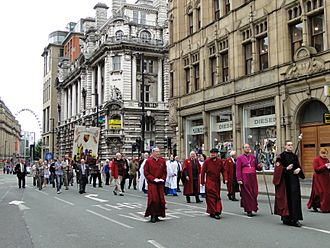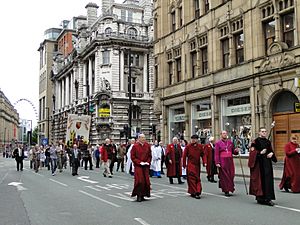Whitsun facts for kids
Quick facts for kids Whitsun |
|
|---|---|

Manchester 2010 Whit Walks
|
|
| Also called | Pentecost (Western), Trinity Sunday (Eastern) |
| Observed by | Ireland, United Kingdom and some former colonies |
| Type | Christian, Public |
| Begins | 7th Sunday After Easter |
| Date | Easter + 49 days |
| 2024 date | 19 May |
| 2025 date | 8 June |
| 2026 date | 24 May |
| 2027 date | 16 May |
| Frequency | annual |
| Related to | Pentecost, Whit Monday, Whit Tuesday, Whit Friday, Trinity Sunday, Beltane |
Whitsun (also called Whitsunday or Whit Sunday) is a Christian holiday. It is celebrated in Britain and other countries by Anglicans and Methodists. Whitsun is another name for Pentecost. It happens seven Sundays after Easter. This day remembers when the Holy Spirit came down to Jesus's followers. This event is described in the Bible, in the book of Acts 2.
In England, Whitsun also took on some ideas from Beltane. Beltane was an old pagan celebration of Summer's Day. This day marked the start of the summer half of the year in Europe. The week after Whitsunday is called Whitsuntide. In medieval times, this week was a holiday for farm workers called villeins. They were free from working on their lord's land. This break was important in the farming year. Whit Monday, the day after Whitsun, was a holiday in Britain until 1971. It was then replaced by a Spring Bank Holiday in late May.
Whit was a time for many different celebrations. It was very important culturally. It was a tradition for children to get new clothes. This happened even in the poorest families. This custom continued well into the 1900s.
In the North West of England, church parades still happen around this time. They are called Whit walks. Sometimes they take place on Whit Friday, the Friday after Whitsun. These parades often include brass bands and choirs. Girls in the parades usually wear white dresses. Traditionally, Whit fairs (sometimes called Whitsun ales) also took place. Other customs, like Morris dancing, were linked to Whitsun. However, most of these traditions now happen on the Spring bank holiday. The village of Whaddon, Cambridgeshire, has a special Whitsun tradition. People sing a unique song around the village before and on Whit Sunday itself.
Contents
What Does the Name Whitsun Mean?
The name "Whitsun" is a shorter way of saying "White Sunday." This name was used in old English writings. For example, it appears in "the Holy Ghost, whom thou didst send on Whit-sunday." The word also appears in Icelandic as hvitasunnu-dagr.
Some people think the name comes from the white clothes. These were worn by people called catechumens. They were preparing to be baptised on that Sunday. Also, in England, white church clothes were traditionally worn on this day. This was instead of the usual red. Another idea is that young women in the village would come to church in new white dresses.
Another idea is that "Whit" comes from the word "wit". This word means understanding or wisdom. So, Pentecost was called Whitsun to show the wisdom of the Holy Ghost. This wisdom was given to Christ's followers.
The day after Whit Sunday is called Whit Monday. The whole week after Whit Sunday is known as "Whitsuntide" or "Whit week."
How Whitsun Was Celebrated
Whitsun was one of the most popular holidays in the old calendar. It was the first holiday of the summer. Whit Sunday, or the week after, was a time for big celebrations. These included festivals, fairs, shows, and parades. In southern England, there were Whitsun ales and Morris dancing. In the north, there were Whit walks, Club Days, and wakes.
In Manchester during the 1600s, the nearby Kersal Moor Whit races were a huge yearly event. Many people would gather there. The area turned into a giant fairground for several days. When factories and mills became common, towns would often close down for a whole week. This was to clean and fix the machinery. This week of closure, or wakes week, often happened during Whitsuntide.
Whit Monday became an official bank holiday in the UK in 1871. But it lost this status in 1972. That's when the fixed Spring Bank Holiday was created instead.
Whitsun in Stories and Films
Whitsun has appeared in many books and movies over the years. This shows how important it was in culture.
- In 1485, Thomas Malory's Le Morte D'Arthur tells how the Knights of the Round Table saw a vision of the Holy Grail on a Whitsunday. This led them to search for it.
- In 1611, William Shakespeare's play The Winter's Tale mentions Whitsun.
- In 1849, Charlotte Brontë's novel Shirley has a scene during a Whitsun procession.
- In 1853, Charles Dickens wrote about a scene set on "one Friday in Whitsun week" in A Child's History of England.
- In 1964, The Whitsun Weddings is a famous poem and book title by Philip Larkin.
- In 1942, the film Went the Day Well? shows a fictional English village taken over by soldiers during Whitsun weekend.
See also
- Whitsun Ale (especially in English villages), a county fair with games, Morris dancing, and music.
- Semik
- Rusalii
- Counting of the Omer


